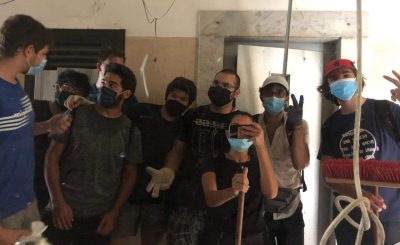BY RAYMOND LIU AO
Castle on the Hill staff writer
Beirut, Aug. 4, 2020, a day that will remain in infamy.
“Every Lebanese person remembers their exact location when the Beirut explosion hit,” said Jason Bouramia ‘22, Lebanon. “Every person remembers that evening. As the sun started setting, I remember my door rattling and shaking. My dad and sister were a few kilometers away from the port. I remember calling them and my sister sobbing.”
The explosion, which left at least 200 dead and 5,000 hurt, was blamed on the Beirut port authority and Lebanese Customs for leaving some 2,750 tons of highly explosive ammonium nitrate in a hangar for nearly seven years in unsafe conditions.
After a year of rising hyperinflation and political instability in Lebanon, the aftermath of the explosion was the tipping point of the political, social and economic crises in Lebanon. Yet, Jason set foot in Beirut every day, ready to help.
“I woke up at 6 every morning since volunteer buses to Beirut departed at 7:30,” he said. “With a mask and shovel, we would walk around the streets in Beirut and do the best we could to help. From cleaning up the remains of a hospital with blood stains on the floors to picking up concrete blocks from destroyed homes; this was the only thing we could do to help our country.”
Jason heard stories about helping people blinded from the explosion, finding people stuck under concrete and cleaning up the remnants of people’s homes. These countless stories of success and agony led to a feeling he would describe as numbness.
“At one point, my parents thought I was becoming obsessed with these projects,” Jason said. “ I would come back home at 8 p.m. and continue contacting people to arrange the rides for the next day. But, I felt a social responsibility to do whatever I could to help out.”
His involvement in the aftermath of the Beirut explosion went beyond volunteering in the streets. Jason led the data-collection database for the non-profit Locate Victims Beirut.
“Due to the massive scale of the explosion, many people ended up deceased, displaced, or missing,” he said. “Without a database, these victims would not have been able to be identified. My work in Locate Victims Beirut allowed for the gathering of 631 deceased and missing people in a concise place.”
Locate Victims Beirut served as a primary contact for families to report their missing family and friends. The organization served as a guideline to find over 350 missing people.
“At a certain point it felt that we were doing the government’s job,” Jason said. “Every day after coming back home from volunteering in Beirut, I would stare at my screen for hours updating the database, responding to our 24/7 hotline, calling people with missing family members.”
Locate Victims Beirut was featured in Lebanese political talk show “Sar el Waqt,” and international media outlets such as The Guardian, The New York Times and USA Today.
Jason wants to continue working in crisis prevention, mitigation and preparedness frameworks.
“Anyone is able to make a change if they have the mindset, energy and time to put in,” he said. “Making a change is something I want to do. I want to be able to take this further. Take the framework to identify victims and apply it whenever a disaster happens to promote quick resilience and overcoming of crises.”

